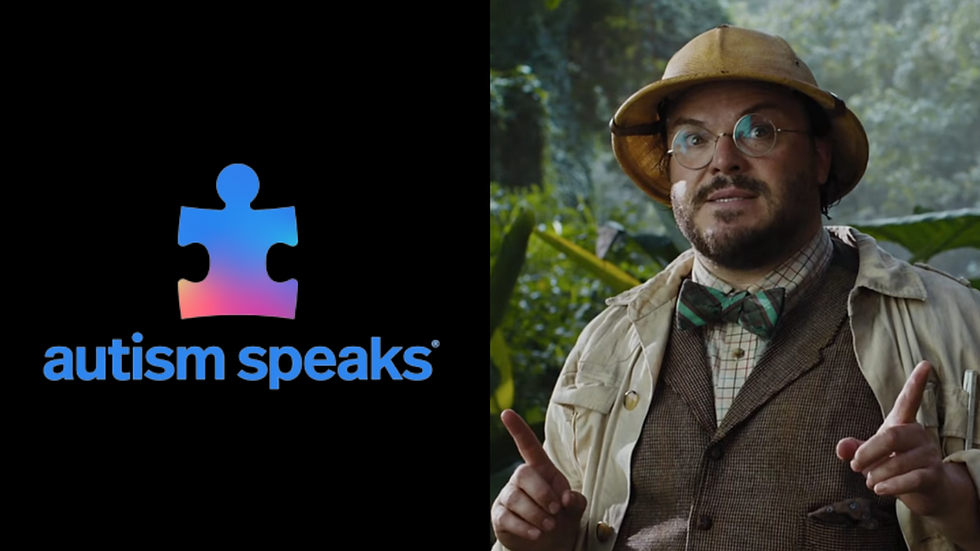Why Is There Such Outrage Towards Jack Black And His Support For 'Autism Speaks' ?
- Demi Lynch

- Oct 10, 2022
- 3 min read

**This story discusses suicide and ableism. If any of these conversations are triggering please contact 1800 RESPECT.**
Without exaggeration Autism Speaks hates autistic people.
I know that may seem blunt, or perhaps even overdramatic, but for years this organisation has been harming and stigmatising the autistic community.
Despite being the largest autism research organisation in the U.S, the charity continues to promote ableist campaigns and inaccurate advice.
So you can imagine my shock when I found Jack Black's name trending on Twitter alongside 'Autism Speaks.'
A resurfaced Twitter post from 2018 shows the Kung-Fu Panda and Jumanji actor Jack Black at an Autism Speaks fundraising event.
And this isn't the first time the School of Rock actor showed his support for the controversial charity.
In 2013 he hosted a Autism Speaks benefit and in 2015 performed at the 'Light It Up Blue' Autism Speaks fundraiser.
However, Jack Black isn't the only celebrity to endorse the controversial charity.
In 2021 Autism Speaks hosted a star studded fundraiser which featured an array of beloved celebrities including Paul Rudd, Maya Rudolph, Mark Hamil, Terry Crews, Andy Samberg, John Oliver, Stephen Colbert, Sarah Silverman, Jimmy Kimmel and Adam Sandler.
So how exactly is Autism Speaks so problematic?
How can a charity dedicated to autism be deemed ableist?
Should we give celebrities the benefit of the doubt for supporting such a controversial organisation?
Let's deep dive shall we.
For over a decade, Autism Speaks tried to find a cure for autism.
They treated autism like it was some type of disease that could be cured.
Only until 2016, one of the goals in the Autism Speaks mission statement included finding a "cure" for autism.
This hatred and despise for the autistic community continued to show in their autism awareness campaigns.
In 2006 the charity released a short film about parents raising autistic children titled, ''Autism Every Day.'
During an interview, one of the mothers said she contemplated driving off a bridge with her autistic daughter.
She said the only thing stopping her from committing a murder-suicide was her neurotypical daughter.
As you can imagine this video led to worldwide backlash and consequently Autism Speaks removed the film from their platform.
However, only three years later the charity released yet another controversial short film about autism.
It would be an understatement to say the 2009 film, 'I Am Autism,' was harmful to autistic people.
Throughout the video a menacing voice warns people about the dangers of autism and how the disability can "rob you of your children and your dreams."
"I will make sure your marriage fails," says the ominous voice, "your money will fall into my hands and I will bankrupt you for my own self gain."
Autistic Self-Advocacy Network (ASAN) co-founder and leading autistic self-advocate, Ari Ne'eman, says the video portrayed autistic people as "burdens or objects of fear and pity."
"Groups like Autism Speaks choose to use fear and stigma to raise money," says Ne'eman, "but very little is going toward services, research into improved educational methodologies and things that have a practical impact on our lives."

The controversy continued in 2019 when the charity partnered up with Sesame Street and their autistic character, Julia.
As part of the collaboration, Julia promoted Autism Speaks and their '100 Day Kit' for parents of children that have been recently diagnosed with autism.
The advice in the kit was well and truly awful, harmful and at many times inaccurate.
It encouraged parents to grieve their autistic child who they thought would be neurotypical.
It advised parents to express their anger towards autism to "tell the people around you that you hurt and are outraged that this diagnosis has happened to your child."
It said in rare cases children could even recover from autism.
It claimed autism was "on the rise" and that autism is "more common in boys."
And the kit featured a parent testimony that compared autism to cancer.
This kit was released to the world only THREE years ago.
Despite the ongoing backlash and criticism this million dollar organisation seems to still have an anti-autism agenda.
Now that we know all this, can we really excuse celebrities for supporting such an ableist, harmful organisation?
Should we really just give them the benefit of the doubt?
I understand as a public figure it's important to do charitable work to show your followers you care.
But is it really all that beneficial when the charity you support oozes fear-mongering propaganda?
With all the charities and causes in the world, why must the rich and famous endorse an organisation that sees the autistic community as burdens?



